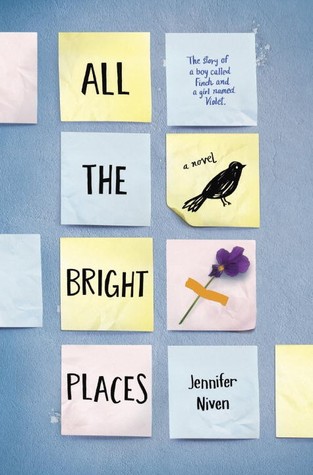We follow Finch, a troublemaker high-schooler who’s constantly
in and out of the councillors office and school, and Violet, ex-cheerleader,
ex-flute-player, ex-student-council-member. Violet is ex-perfect-student since
the death of her sister nine months ago. They meet on top of a bell tower, when
Violet is contemplating to kill herself. The story then follows them on a road
trip to experience as many places their state has to offer.
The book isn’t by any means perfect. If you are irritated by
quirky-character-syndrome, see Augustus Waters in TFioS, this may not be the book for you. Theodore Finch is obsessed
by dying right from the start, telling us all about the different ways to go.
He has a dramatic way of speaking, and changes his personality weekly. But he’s
likeable. And so is Violet.
If you like the two comparisons that All The Bright Places was linked too: Eleanor and Park and TFioS,
you will probably like this too. There’s a lot of comparisons between this and TFioS, which are fair in some respects
and not in others. Yes, it has a similar style, yes it deals with usually taboo
topics in YA, but they are still important topics to deal with. Niven
occasionally handles the aspects of mental illness blunderingly, but from the
authors note at the end, you can tell the experiences she writes about comes
from truth.
All The Bright Places
reminds us that between the episodes of sadness, there are pieces of hope. The
book gets a bit troupe-y in places: see parent’s banning daughter, insta-love,
slight case of manic-pixie-dream-girl/boy. However it throws in some brilliant
ideas, the road trip is an excellent example. Violet and Finch try to pick up
the pieces of themselves together, and in doing so you are reminded of the
Bright Places that can exist in life.
There’s been a lot of criticism over the cotton-candy-style
of writing, so I wanted to add my cents-worth. I personally liked Niven’s
writing, I thought it was easy to read and differentiable between the two
points of view. Niven was bold to touch a topic that hadn’t been handled much
before in YA, so there is a need to make it accessible to people. Hopefully All
The Bright Places will pave the way for bigger and better YA works on mental health
and other stigmatised issues.
I know this sounds like a mixed review, and in all honesty I
did like All The Bright Places. But
maybe that’s because I’m a sucker for a quirky character and emotionally
manipulating stories.
Rating: 7/10
I received a copy of this book from Penguin when I interned for them last year







